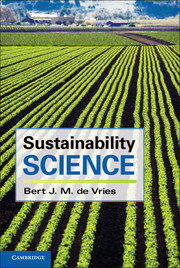Book contents
- Frontmatter
- Contents
- Preface
- 1 Introduction
- 2 The System Dynamics Perspective
- 3 In Search of Sustainability: Past Civilisations
- 4 The World in the Past 300 Years: The Great Acceleration
- 5 Sustainability: Concerns, Definitions, Indicators
- 6 Quality of Life: On Values, Knowledge and Worldviews
- 7 Energy Fundamentals
- 8 On Knowledge and Models
- 9 Land and Nature
- 10 Human Populations and Human Behaviour
- 11 Agro-Food Systems
- 12 Renewable Resources: Water, Fish and Forest
- 13 Non-Renewable Resources: The Industrial Economy
- 14 Towards a Sustainable Economy?
- 15 Outlook on Futures
- Glossary
- References
- Index
- Plate Section
- References
9 - Land and Nature
Published online by Cambridge University Press: 05 January 2013
- Frontmatter
- Contents
- Preface
- 1 Introduction
- 2 The System Dynamics Perspective
- 3 In Search of Sustainability: Past Civilisations
- 4 The World in the Past 300 Years: The Great Acceleration
- 5 Sustainability: Concerns, Definitions, Indicators
- 6 Quality of Life: On Values, Knowledge and Worldviews
- 7 Energy Fundamentals
- 8 On Knowledge and Models
- 9 Land and Nature
- 10 Human Populations and Human Behaviour
- 11 Agro-Food Systems
- 12 Renewable Resources: Water, Fish and Forest
- 13 Non-Renewable Resources: The Industrial Economy
- 14 Towards a Sustainable Economy?
- 15 Outlook on Futures
- Glossary
- References
- Index
- Plate Section
- References
Summary
Introduction
At the dawn of the environmental movement in the 1960s and 1970s, there was increasing concern about the damage done by humans to nature – and nature protection and conservation were the stated goals. Ecology and the emerging environmental sciences were at the forefront. With the advent of the idea of sustainable development in the 1980s, more emphasis was put on the legitimate aspirations of many people to (material) well-being, that is, development. There was also an increasing realisation that natural systems are always changing and evolving, and that not much ‘undisturbed nature’ had been left after millennia of human evolution.
Nevertheless, ecology is still considered by many the core of sustainability science. The word is derived from the Greek οικοσ, house, and λογοσ, reason or idea, and it is, in a broad sense, the art and science of seeing things as a whole. As such, it has its formal scientific offshoots in theoretical and systems ecology, and its more social and transcendent expressions in social and human ecology. Its core idea has also shaped new bridging disciplines like landscape ecology and environmental and ecological economics. Ecology supports a rich interpretation of sustainability and a broad view of the environment-development nexus. It should not be confounded with environmental science, which has branched out in more practical and applied forms across various disciplines (chemistry, economics and others). Ecology is crucial for understanding the theory and practise of sustainable development, and more than one chapter should be devoted to it. This is not possible so I refer to some textbooks in the Suggested Reading.
- Type
- Chapter
- Information
- Sustainability Science , pp. 244 - 295Publisher: Cambridge University PressPrint publication year: 2012



